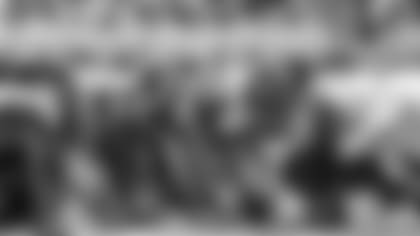We come at last to the end of pre-draft season.
And really, as we count down the final hours leading to the NFL Draft, what more is there to say? The event has become big on a scale no one imagined when it was first televised three decades ago – and really, it has grown beyond what it was even a decade and a half ago when the Jaguars came into the league.
I asked Tony Boselli during a break from Jaguars This Week Wednesday how many players attended the NFL Draft in New York when he was the No. 2 overall selection by the Jaguars in their 1995 inaugural season. He said 10, at the most. Tonight, 26 players will attend.
The draft just gets bigger and bigger and bigger, and there seems no limit, and because of that, we have spent the last three months analyzing, prognosticating – and in some cases guessing – from every possible angle.
What to make of the draft? To me, it's a symbol, a reminder of how something really big – which the NFL was when I was growing up – can get monstrously, unimaginably bigger, which is where it is now. It's yet another example of how the NFL can at times do no wrong. The draft, after all, is not a game. There are no helmets, and there won't be any games that count for four months, yet the event has dominated the sports world for weeks and will do so again this weekend.
It is glitz. It is glamor. It is analysis. It is mocks. It is quick-trigger reaction.
It is argument. It is entertainment. It is fun.
But beyond all of that, football people are quick to remind you, is it's really important. Because beyond all of the mock drafts and the red-carpet walk and the chatter, it's still the best way to acquire players that fill the core of a team.
At its core, that's still what the draft is. I'm almost sure of it.
Let's get to it . . .
Kelvin from Atlanta, GA:
Do teams who may have good relationships with other teams sometimes do some "behind-the-scenes" discussions about possible trade scenarios during the draft?
John: Teams with good relationships do it and teams with horrible relationships do it. Pretty much every team talks with every other team in the weeks leading to the draft. Jaguars Director of Personnel Terry McDonough handles the team's draft day trades and he said recently he has talked to a representative from every team. When it comes to trading, it's not about great relationships. It's about getting value from selections and if you think you're doing that, you'll trade with your fiercest rival.
Brett from Ocoee, FL:
Rejoice! The month of mock drafts is over! Now to endure through the month of draft grades.
John: The only thing that matters less around the draft than the mocks is the grades.
Joe from Jacksonville, NC:
Since early January everyone was talking Morris Claiborne as the No. 1 cornerback available in the draft. A couple of days ago you started seeing Stephon Gilmore's name thrown around as the No. 1 corner and since then he has been ahead of Claiborne in a couple of mock drafts. Why the sudden jump?
John: I'm not a big believer that players jump on real draft boards nearly as much as they jump on draft boards that are available to the public. The ones that are available to the public are often done by media and the ones done by media are often based on what the media is hearing from sources inside organizations. I had been hearing for about six weeks that Gilmore may be as good as any corner in the draft. For a while, I didn't see that reflected in any mocks. Last week, Peter King wrote it and suddenly Gilmore is at the top of many draft boards. My sense is that to many scouts he has been there for a while.
J-School Corby from Denver, CO:
Fletcher Cox. I like the guy a lot, and I like the pick a lot if he comes to Jacksonville. The question is would the Jags play him exclusively at tackle, or would they use him as a first-and second-down left end who moves inside on third to keep him on the field?
John: The appeal of Cox is you could play him a variety of places, and certainly your scenario would be one way to use him. I certainly think he would play tackle on pass-rushing downs, because if he has strength as a pass rusher it's from the inside. I imagine he could play either inside or outside on first and second down.
TreyZu from Lyon, France:
Let's say I am Drew Hampton or Mike Perkins handling the Jaguars' selection on to the commish, and I don't like the selection. For some reason I change it to my desired selection. What happens if my selection was made, is it permanent or can something be done to manipulate what happened?
John: The card is the pick. And when considering your scenario, I am sure Drew Hampton would never do such a thing. As for Perkins . . .
Chris from Dallas, TX:
Get it through your head! Gene Smith is picking Whitney Mercilus. I can read him like a book.
John: It wouldn't be surprising. Wish I'd mentioned that.
Joe from Aurora, IL:
When did A.J. Green become a top-flight receiver? Sure, he has the measurables, and he broke 1,000 yards last season (who didn't?), but I thought you needed to have more than one year of success before people started grouping you with the elite of the elite? Personally, I'd rather see Blaine throwing to Julio Jones than Green, you know, someone who doesn't look like they'll get blown over by a strong gust of wind.
John: He had the measurables and 1,000 yards as a rookie? That's when he became a top-flight receiver – or at least, that's when he became a guy who seems destined to become one. Calvin Johnson didn't have 1,000 yards as a rookie. Larry Fitzgerald didn't do it. Andre Johnson didn't do it, although he got close. Receiver is a very difficult position to play at a high level right away. Green had 65 receptions for 1,057 yards and seven touchdowns and helped the Bengals become a legitimate offense as a rookie. If he's not a top-flight receiver yet, it's hard to imagine he won't be soon.
Todd from Beaufort, SC:
What did you think of the comment by Terry McDonough that Miami is definitely taking Tannehill, and if anyone wants him, they gotta trade with the Jags? Do you think it will get us the trade back we are looking for?
John: I think it was exactly what it sounded like – another signal by the Jaguars that they would love to trade down. McDonough and the Jaguars very much hope what he said is true, and there's nothing wrong with putting it out there so there's no misunderstanding. As for whether it will get the Jaguars the trade back, I don't know that it will help or hurt. If a team wants to trade up, they'll trade up. What teams say in the media doesn't have that much to do with it.
John from Jacksonville:
Is it feasible for Gene to trade down twice resulting in no first-round pick at all in an effort to strengthen the second and third rounds? If so, that would make for a dull Thursday night for us.
John: Feasible? Yes. Likely? No. The Jaguars would like to trade back because there are players in the middle and late parts of the first round they believe can really help the team, and there are players in the second round that could do that, too. I get the sense that if they trade into the middle of the first round they like several pass rushers there. I don't know that you're going to get the same level of players at that position in the second round as you would the first.
Dale from Hampton, VA:
Why is everyone willing to accept a pretty good wide receiver at pick 7, but seem to hate that we "settled" for a pretty good defensive tackle at pick 10?
John: I hear what you're saying and agree with your premise – although I think Tyson Alualu's better than pretty good. Your point speaks to the heart of best-available-player versus need and it's the risk facing the Jaguars if they indeed select Justin Blackmon. Most scouts would tell you that he's the best wide receiver in this year's class but perhaps not destined to be a No. 1 receiver along the lines of Andre Johnson or Larry Fitzgerald. The response of the pro-Blackmon crowd is that even if he's just really good he's better than the receivers the Jaguars have. If the Jaguars take Blackmon and pass on a player who they believe is a core player at another position, you're weakening your team for the long term to strengthen it for the short term. That's not a prudent way to build. That's the theory, at least. All of that said, it seems unlikely the Jaguars would pass on Blackmon if he's there and if he is the pick, the odds are pretty good he'll be a good player for a long time and that's not a bad thing.
Steve from Jacksonville:
Fans lean heavily on hits and misses in past drafts to criticize a GM but rarely mention players that were adored by the fans then passed over, and later proved to be total busts on some other team – thus justifying the GM's judgment. In the Jags' case, passing on Brady Quinn (twice) comes to mind. There were plenty of "not going to renew" comments on that one but somehow it never comes up much anymore.
John: Most people have selective memories. It makes life easier. Most fans have really selective memories. It makes their points much easier to prove.
Joey from Middleburg, FL:
I'm still trying to digest your response to Chris from Section 232 on Monday. You wrote that you doubted any running back (including MJD) would draw a second-round draft selection in a trade. Why wouldn't ANY NFL team be willing to part with a second-round pick in exchange for three-four years of 1,000 yards of offense? One of those two (2nd rounder v. MJD) is more of a sure thing than the other.
John: This point is often difficult to swallow. Running backs in theory have far higher trade value than they do in fact. One reason is the position depends on so much around it to succeed – i.e., without a quality offensive line, few backs can be productive. The other reason is the comparatively small window backs have in which to be productive. You say a team trading a second-round selection for Jones-Drew would be receiving three or four seasons of 1,000 yards of offense. Many personnel people would view it as giving up a second-rounder for a running back entering his seventh season and therefore possibly close to not being a 1,000-yard player. I don't know that that's true with Jones-Drew because he's a special player, but personnel people view running backs as having comparatively smaller windows of productivity.
Andrew from Section 232:
What's the first question you're going to ask our new Jaguar when you interview him?
John: 'Sup?













